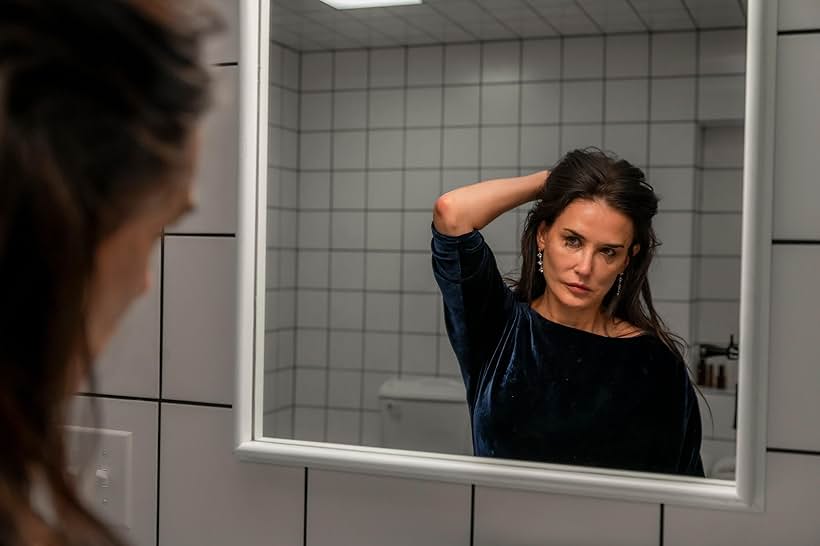By Freya Parker, Third Year, English Literature
Coralie Fargeat's sophomore feature is a satirical body horror which explores the perceived 'curse' of ageing as a woman, in our modern culture obsessed with the allure of youth. Elisabeth Sparkle (Demi Moore) is a fading celebrity who, after being fired from her television show on her 50th birthday, learns of 'The Substance' - a black market drug which promises a “younger, more beautiful, more perfect” version of herself, who 'births' from her spine and emerges as Sue (Margaret Qualley). But there's a catch: there must be a weekly identity swap between Elisabeth and Sue, otherwise there will be horrific consequences.
The film opens with a symbolic montage of Elisabeth's glistening star on the Hollywood Walk of Fame gradually becoming tarnished and cracked, much like her washed up acting career by the time we are introduced to her. Fargeat quickly establishes the shifting attitudes towards women once they reach fifty and are rendered obsolete, in the entertainment industry and society at large. Such views are personified by Elisabeth's (and later Sue's) boss, Harvey (Dennis Quaid), a misogynistic and leering television executive. He is mostly captured through uncomfortably close fisheye shots, as he messily stuffs his face with shrimp and ogles at young women. The not-so-subtly named Harvey is clearly a gross caricature of powerful men in Hollywood, though his sexist language and behaviours are strikingly realistic of the impossible expectations that society projects onto women and their bodies. The Substance examines how such external pressures shape the internal relationship that Elisabeth has with her own body.

Beaten down emotionally after losing her primetime television position, as well as physically in an unexpected car crash, Elisabeth's discovery of the 'The Substance' could not have come at more opportune time. Demi Moore delivers a career best performance, poignantly embodying a character who is hyper aware of how Hollywood equates youth with worth. The film capitalises on the current and rising interest in plastic surgeries, injectables, and other body modifying methods, to present a dark vision of a possible future. Through the fetishisation of the young and attractive Sue, who is frequently viewed in lecherous close ups of Qualley's semi-naked body, Fargeat imagines a disturbing dystopia in which the only way to have any justification for existing is to be youthful and sexually appealing.
As an English student, I couldn't help but draw parallels between The Substance and another cautionary tale about the desire for youth: Oscar Wilde's The Picture of Dorian Gray. As the film progresses, it is made clear that Elisabeth will do anything to stay eternally twenty-something in order to maintain relevance in the industry. She essentially becomes the disintegrating portrait of Dorian Gray hidden away from society, whilst Sue relives Elisabeth's 'glory days', indulging in a hedonistic lifestyle. Amidst such decaying moral conditions, a ferocious, gruesome struggle emerges between Elisabeth and Sue, as they each tussle for a few extra days of embodiment - a representation of how the patriarchy pits women against each other in order to keep them oppressed.

There is no denying that The Substance is extremely absurd in its satire. However, I found that the final act lost me slightly, becoming so utterly outrageous in it's grotesquerie that the sincere messages about ageism and misogyny were (quite literally) swamped in favour of being as shockingly blood-soaked as possible. Despite this, The Substance has proven itself to be unforgettable, having not left my mind since I watched it over a fortnight ago. The 2 hour 20 minute run time flies by; I could hardly take my eyes off the screen, par some of the goriest moments in which it revels in pure grisliness and body horror. The unflinching depiction of the disposable treatment of women and the absurdity of beauty standards in the modern age, provides a nuanced look at womanhood which is sure to leave quite the impression on viewers.







